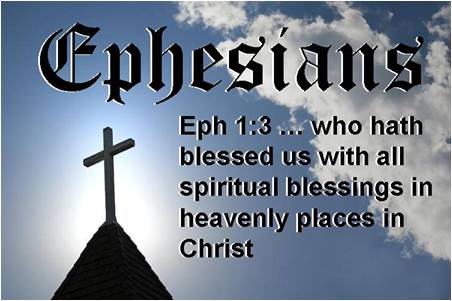
Gene Cunningham - May 28, 2010
Ephesians #1

NOTE: Session 8 was inadvertently not recorded. The conference handout notes are . Key Text of EPH 2:8-10. Ephesians lays out the gift of salvation: (1) By Grace, Chapter 1; (2) Through Faith, Chapters 2-3; (3) Unto Good works, Chapters 4-6. Most used words in Ephesians: 10 times — "knowledge"; 12 times — "power"; 12 times — "grace"; 14 times — "one"; 6 times — "fullness". Outline of Chapter 1: (1) The finished work of redemption (Eph 1:1-14); (2) The unfinished work (Eph 1:15-23). Works has nothing to do with justification. Sanctification is an ongoing work. There is nothing God is capable of providing that we don't have (Eph 1:3). The ultimate plan of God will be a reality in eternity (Eph 1:4). We've been adopted as sons (Eph 1:5; see notes ):
- Gen 25:23: God talking to Rebecca explains the two children she'd have; God selected a people through Jacob; Elect (chosen) and predestined (relates to service, not salvation).
- Gen 25:29-34: Jacob was a momma's boy, but had a spiritual eternal birthright (the messianic privilege).
- Gen 27:27-29, Gen 27:36, Gen 12:1-3: Jacob deceives Issac, but gets physical and spiritual blessings.
- Gen 32:1-2, Gen 32:24-30: We have to keep in mind are resident of two realms (Phi 3:20); God crippled Jacob as a badge of honor.
Conference notes for this series can be found [HERE]
Scripture References: Ephesians 1:15-23, Genesis 27:27-29, Ephesians 1:1-14, Genesis 25:29-34, Philippians 3:20, Ephesians 2:8-10, Genesis 25:23, Genesis 32:24-30, Ephesians 1:5, Genesis 32:1-2, Ephesians 1:4, Genesis 12:1-3, Ephesians 1:3, Genesis 27:36
From Series: "Ephesians - Positions of Privilege in the Household of Faith - Colorado 2010"
Ephesians is a Prison Epistle along with Philippians Colossians and Philemon (see Eph 3:1 Eph 4:1 and Eph 6:20). Written by Paul from Rome the epistle expands on themes in Colossians much as Romans does to Galatians. Whereas Colossians develops the all-sufficiency of Christ to the Church Ephesians shows the blessings of that ?fullness? enjoyed by the members of God?s family. The idea of unity resulting from reconciliation runs strong through the book (Eph 1:9?10; Eph 2:16?18; Eph 3:4?6; Eph 4:3?6; Eph 5:30?32; Eph 6:18?20). It is possible that the epistle was actually a circular letter to the churches of Asia. Paul?s goal is to inform the saints of their privileged status and exhort them to live in a way worthy of their standing. Taught in Colorado 2010. Lesson 8 was inadvertently not recorded.

